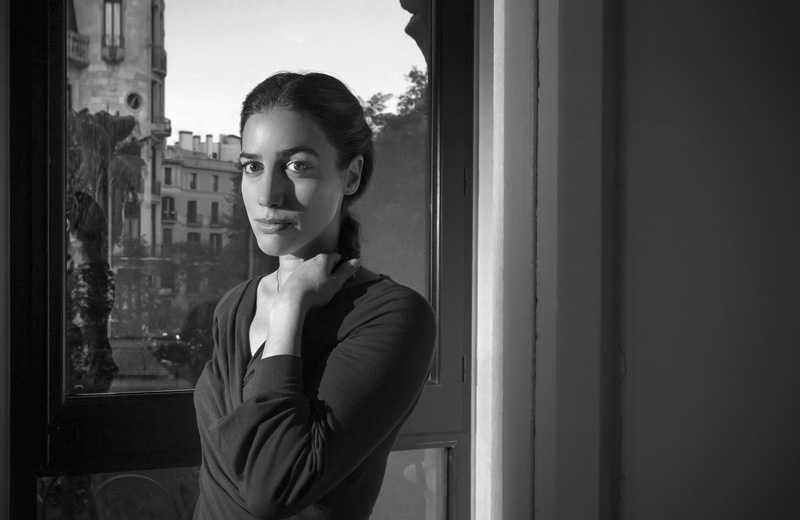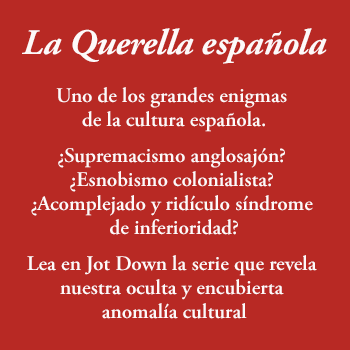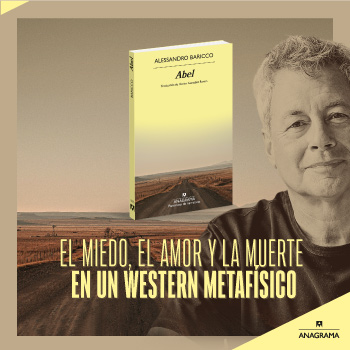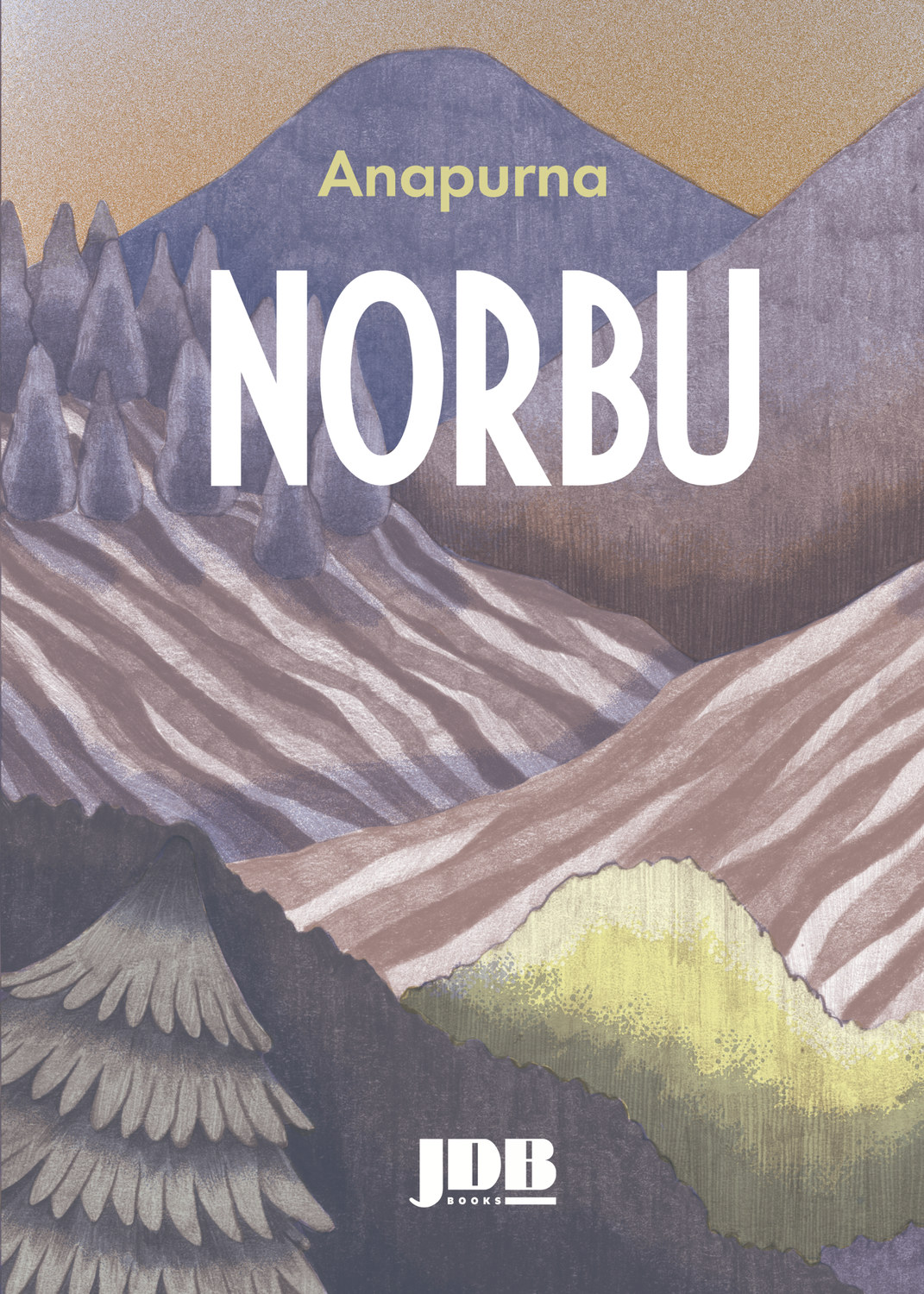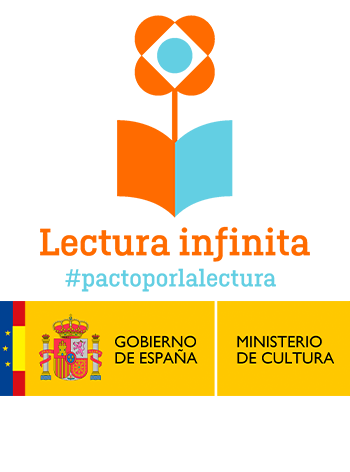Photo: Alberto Gamazo
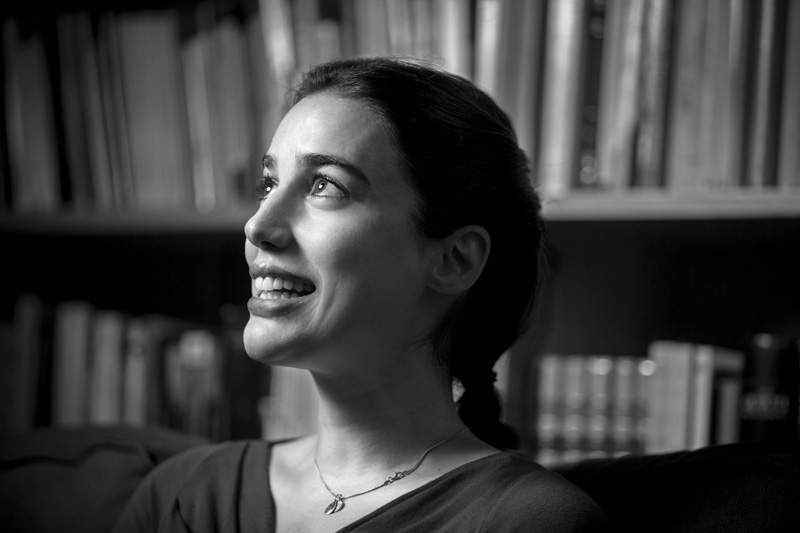
(Versión en español)
Desire, transgression, light. Nabokov. To keep a conversation with Lila Azam Zanganeh (Paris, 1976) causes genuine intellectual vertigo. This writer, born in Paris from Iranian parents, lives and works in New York and combines the creation of her literary works –The Enchanter was the first one, an unclassifiable literary artifact about her relationship with Nabokov– with collaborations for Le Monde, The Paris Review, The New York Times or La Repubblica. Among many other merits, she is the only woman at the Nabokov Literary Foundation and is a member of the Man Booker prize jury.
Busy with many travels and the completion of her second book, a rewriting of The song of Roland, we seize her stopover in Barcelona returning from Majorca, where she has taken part at Converses literàries a Formentor, to talk with her about literature, writing, reading and Nabokov; a writer that she reads and rereads obsessively. She says that she loves literature just as much she dreads reading. And that is where the game begins.
How were your days in Majorca at the Converses literàries a Formentor?
They were completely marvelous. I was very surprised both by the way the festival was organized and the place itself, which was of incredible beauty. I have always had a special relationship to Spain; I always feel like I’m back home in a way, I felt incredibly happy.
You gave a talk about The Golden Ass (Lucius Apuleius). What was it about?
I was educated in France, and over there you always have to answer questions by asking why, how… The theme was “Spirits, ghosts and lost souls”, so I was wondering what the why to this question was and what the connector was. I realized that maybe it was a question related to desire because part of the reason why these lost souls would come back was the desire to continue living, to continue something that was unfinished. So it struck that the connection between The Golden Ass and that question was a notion of transgression. And to me, of course, it is all connected to the work I am finishing now, it’s the very link that Apuleius makes between transgressions as a means to start a narrative. Any kind of transgression that occurs within the story: he wants to become an owl and puts an ointment but instead of becoming an owl, the ointment is the wrong one and he becomes an ass. One of the principles of these ancient Roman religions was that you should not meddle with the invisible. So the first transgression is that Lucius is extremely interested in becoming a wizard, meddling in magic. More than a wizard it’s a sorcerer, really. The second transgression is that he gets the ritual wrong. That begins the story. And then, much of the story is about desire, and desire itself is always a transgression, it’s a question without an answer, it’s about going against something. And of course there are ghost stories proper within the narrative. To summarize it, the story is about Lucius finding the goddess Isis, but in order to reach Isis he has to go through these transgressions, meet a few ghosts, find many adulterous men and women and finally get to spiritual elevation. For me it was a beautiful occasion to re-read the text with that lens. And of course so much of the playfulness is connected to these two themes. For me of course it’s much more than the theme of the “Converses”, it’s what always has interested me most in literature: the connection between transgression and desire, which are both related to literature. And it’s literature as a form of desire, the desire for literature and the desire that makes literature.
Although you talked about a work by Lucius Apuleius, most people relate your name to a Russian writer. Why Nabokov?
At the end of the day I think that my experience in that regard is a bit like falling in love. It’s a question of its incandescence or phosphorescence, it’s something that illumines you so deeply that there is really no why. It was just a feeling of intense recognition in his English foremost. Of course there is a few biographical accidents where I find certain similarities: the exile, the multiple languages, the writing in English… perhaps initially it was mostly exile, his background –which was very reminiscent of my mother’s background-, and it was her nostalgia twice removed which came down to me which I felt in his work. And in a way it’s inside those sentences, where he reinvents the English language in a sense, that I felt at home. First it was a feeling of recognition, of incandescence as a form of infatuation, and then it interested me because Nabokov thought that art could teach us nothing but to become better observers of the world, that it would not teach you messages or anything about history. You don’t read Anna Karenina to learn about adultery. Some of the exam questions he gave to his students about Anna Karenina were about the pattern of the curtains. So that is what art makes you do, observe the world better. The book to me was about why beauty matters, why the imagination matters and why literature matters. And in this time it is a relevant question, so my book was very small in its scope initially, it was really just a record of my own adventure as a reader, but then it became also a record of my adventure with that form of art, which I most identify with, which is precisely the art that has nothing to teach us but to become better observers of the world. And I’ve always been interested in aesthetics and the intrinsic beauty of patterns. He also draws a connection between beauty and transcendence. He believes more than anything in imagination. There is nothing more real than imagination. It’s a defining characteristic of the human experience, and in the end my own also became a pamphlet in defense of literature and fiction.
Was your love to literature what brought you to this writer or it happened the other way round?
No, my love for literature brought me to Nabokov. I’ve always loved stories. I was raised as an only child, I was extremely shy, for a very long time I had very few friends, and the imagination takes up all the space in the world, especially when you are a child of immigrants. France was a country quite homogenous, especially in the public schools I attended. There were almost only French people. The ideal of the French republic is about complete integration in the French model. Coming into it as an outsider is a strange experience, because you are highly self-conscious of being an outsider first, and then of being the nerd and the first in the class. There is nothing cool about that. I didn’t dress like anybody else, I didn’t really talk like anybody, my parents talked and looked differently… so imagination and books took a huge place. And not just books, I was always a slow reader, I was never the kid who read five hundred books, maybe I just read one book, but I read every sentence five times. And films were the same way, I would watch a film fifteen times over. Not just because you have nothing better to do, but also because it becomes a fantastical experience in its own right, and you enter the universe of that film as if you are stepping inside of it. Like with Back to the future, but to me every film was like going backwards or through or forward in time, the particular world of a film, just like the world of a novel, and I was there like a kid so much so that I’d continue the story, and I would go to sleep at night imagining myself in that book or that film and sort of continuing the adventures with the characters. Those characters were more real for me, were more my friends than people in my school. I was extremely shy. The fact that I outgrew that shyness is a mystery even to me. Nabokov came to me when I was a teenager. My mother read to me some excerpts of Speak, Memory and it was a feeling of intense recognition. And it started almost as a joke, because she was reading Ada, or Ardor and there was this brunette girl, quite young in a beautiful cover with “Ada” written in fluorescent pink and she was naked. I asked my mother what that was, and she told me it was not for me yet. And, of course, any time she said that the next day I was on it. As Ada says, all bright kids are depraved, so I would get my hands on anything that was depraved. By saying it was not for me my mother drew me into it, unconsciously. And there it was. And also it felt even morally close to myself. I don’t know why, although I come from a different background, from a different world, in a way with values from other centuries… I never felt any form of moralistic relationship to the world, to literature or to the arts, so really the amoral quality of Nabokov felt very close to my own sort of spiritual world.
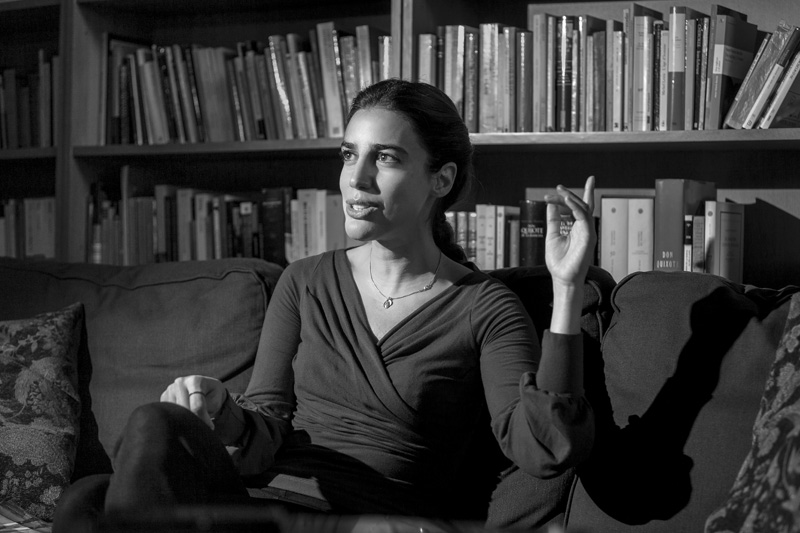
Were your studies on philosophy and literature at École normale supérieure in Paris what gave you this analytical skills for reading (or let’s say, your obsessive way of reading), or it came in a natural way long time before?
I think one has to have a little bit of a bent, an inclination. I have a huge debt in the most beautiful sense of the word to my mother, who showed me all of the world with a sense of immense passion and love for beauty and an immense generosity. Nabokov has the most beautiful definition of aesthetic bliss that I know, in the afterword to Lolita. He says: “Art (tenderness, kindness, curiosity, ecstasy)”. My mother really invented my education, and the main elements that she brought were those elements: tenderness, kindness, curiosity, ecstasy. You could give her anything and she would appreciate it. We would wind up in very strange places in the world, sometimes unappealing places because there was nowhere else to go – though mostly we went to Italy because it was next to where I grew up- and she would point at a small angle of a window where you could see two trees, and she would find it beautiful. That’s how the analytical experience began, it was really for having that capacity for being surprised, astounded and grateful. And she is also a retrospective optimist. Anything that happens she ends up saying that maybe this is good. Many people say it, but she really believes it. All these things were combined: the capacity for optimism, the capacity for curiosity and ecstasy, the capacity for gratitude and the aesthetic appreciation. They were completely inseparable. And that’s what I inherited. I was fortunate because I grew up in Paris. The first time we arrived she took me in front of the Lycée Henri IV, which is the best public school in France, and she told me: “This is where the truly intelligent French kids go to school…” For a few years I stayed at a small school next to our house, but finally I applied and got in, and that was one of the most beautiful days of her life. In that school I met kids from all over France, from any social milieu. Although meritocracy is always a bit of an ideal and there is a lot of social conditioning, my closest friend in Henri IV came from a completely different world. And I was completely an outsider, as well. So all the outsiders sort of bonded together, but they were let’s say exceptional outsiders. They came from different parts of France that as an immigrant I didn’t know, like Brittany and Perpignan. So during the summers we would go to strange and beautiful places. And it wasn’t just that, it was also their socio-intellectual background, their being French was very different from my world if you will, they used idiomatic expressions that I had never heard… And those kids brought with them extreme intelligence and culture, they had far more culture than me. Our good fortune was not to be in Henri IV, it was to meet each other. Being in the company of those kids changed my life. I felt that those kids were my family, and not just them, I feel that any person I meet who is intelligent, generous and kind is part of my chosen family. And that’s why literature began with my mother’s skills but also continued into life with that recreated family. And one of the miracles that happened to me with this book, The Enchanter, is that it has brought me to meet extraordinary people of the same kind as I had met in public school. It’s not the socioeconomic background at all, at day’s end, it’s how intelligent they are, how much they get one other.
When and why did you decide to leave Paris?
I didn’t decide to leave Paris, it came when I got into the École Normale Supérieure. Usually you fail the first or even the second time you try to get in. The first time I failed by half a point and the second year I got in. But I’d never thought I would get in. My father, who had been an athlete all his life, told me “it is like a marathon, try to run it to the end but the photo finish is very competitive, probably you are not going to make it”. So I never thought I would make it, but I got in in the end, and it turns out they have a series of exchange programs with the best colleges internationally, and they sent me to Harvard. It wasn’t my intention to stay in the US and leave France. Harvard was a very interesting place, the students were very bright and it’s the opposite of what people think: they are not snobby and they are not arrogant. They are mostly surprised and scared to be there, and they are kids, but they are very talented kids. After two years there I realized that I loved literature, but I didn’t want to be an academic. There was something about the necessary repetitions of the academic life that I would have a hard time adjusting to. I am very chaotic and disorganized, and realized that forced organization was very difficult. What was I going to do? If I went back to France I would have to be a professor. At the time one of my students became a very dear friend of mine, and he was at law school in Harvard, and had been to the Columbia university in New York before, and he told me that maybe I should try that program. It was a sort of political science and media communications program. So I went to New York and I completed that program, and that changed my life. Not for the political science and media communications stuff, but because I took one writing seminar with Judith Crist. It was non-fiction, it was like a painting class. She’d ask you to write one face or one building. She was the toughest teacher at Columbia, she terrified students, but I came from a very tough public school system, where they told me I was dumb all the time, like a military school. She had taught at Columbia for more than 40 years, she was 80 years old. She always picked her students. I was insecure because English was my fourth language, so I will never master it completely, but at the end of the year she said to me that she was going to give me an A+, and it was the first time in the 40 years she had been teaching that she gave an A+. I still don’t understand why she gave it to me, but what she said changed my life. She said that I should be a writer. She knew I didn’t want to be a journalist and that I did want to write books. She said that I should and I would. After that I had to stay. Maybe it was also an immigrant thing with France, because when I was growing up in France in order to get a job in culture you had to know a lot of people, your uncle had to be a minister or a relative had to be the director of something… and I thought that I had no chance. My parents only saw Iranians: exiled painters, architects, philosophers… They are all extraordinary people, but nobody had a real job, we all lived very strange lives! One of the reasons why I didn’t go back was that I thought that New York gave more of an opportunity to start working, which it did. And also what happened very quickly is that Le Monde ran out of money to send culture correspondents to New York, and I happened to be there. That’s when my school, the École Normale helped me. I called them and I asked if I could work for them and I thought they were going to hang up on me but they asked what I had done and I said I was a normalienne. That’s where the meritocracy helps. They didn’t hang up on me just because I had gone to the public schooling system. And that’s how I started working for them, it was a sort of happy coincidence. But then I realized that if I wanted to work for the French, it was better to be far away because then I had the advantage of being far away, and even if I wasn’t the niece or daughter of anybody, they needed me for strategic reasons.
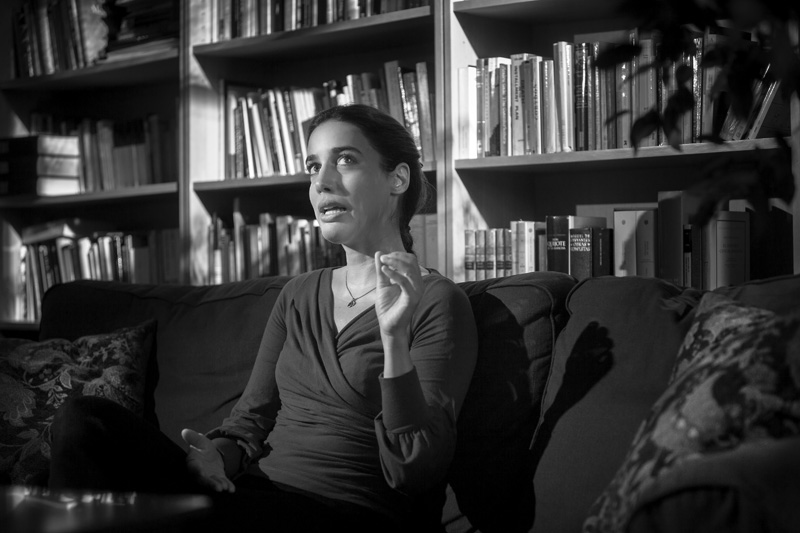
You say that in New York your condition of foreigner changed.
When I was growing up I was always self-conscious of being a foreigner, my parents and I spoke Persian… to this day if you speak Persian in a movie theater people look at you. Some people would look at me funny and I would switch to perfect French, and they were very surprised. I wanted to tell them that it’s possible to be completely something else and completely French at the same time. We all hold these multiple identities, weather cultural or sexual or otherwise. In New York I felt it was the first city in the world where you didn’t feel that self-consciousness. One of my favorite things to do in New York is to travel in the subway, because every train is the United Nations. You look around and you have the entire world there. Everybody speaks different languages, with different accents… if you live there you are a New Yorker, they don’t really care about why and how.
Do you think this is going to change with Trump?
Yes, unfortunately, I think that, at least in part. I don’t know what is going to happen in November, but unfortunately I think that there is danger in the discourse of these people. When I started settling in America and I started having friends from all over the world and different ethnicities, I hated the word “race” because I grew up in Europe and we consider there is only one race, the human race, but in America they say race to mean ethnicity, and you see schools of middle-eastern people together, Hispanics together… and I dislike that. The first time I had a close African-American friend we would meet often with another friend of mine in restaurants in New York, and he would always wait for us outside if we were late. I asked why he did that, and he told me that if he went into the restaurant alone they wouldn’t give a table, that it happened to him twice. So what Obama says in his memoirs is still true today. Taxis won’t stop for a young black man. Racism is endemic, of course, fear of the other is shared by most of the world, unfortunately, and even in a city like New York you have this sort of occurrences. And the problem with people like Trump that makes them extremely dangerous is that discourse becomes uninhibited, meaning that people begin to say out loud what they would previously think and keep to themselves. I feel that some foreigners in New York are becoming self-conscious in a disturbing way like Mexicans, for example, or Muslims. And it’s a terrible thing. I’m curious by nature, I love to talk to all kinds of people, and I remember I saw a woman in a store and I could tell she was Iranian, but she didn’t realize I was too. She had a nametag: “Ziba”, which means “beautiful” in Persian. I asked her where she was from, and she said she was half-American… and then she hesitated. I realized she was self-conscious about being Iranian and Jewish. That’s the beginning of the cracks, the fissures.
But with El Encantador you took a step aside from your family background. Many publishers pressed you to write about your Iranian heritage, to show the similarities with Nabokov’s life. But this was not the aim of your work.
Not at all, and there is only one page in the book where I write about it between the lines. In America there is still of course a strong identity culture, and if you stick to one of these identities you can write books that are more commercially viable. Although, as with every formula, it also has its limits. But I really didn’t want to do that, I didn’t want to sell myself. I knew it was going to be a much harder way, but I hadn’t gone to that public school system that I loved so much and that defined who I became and worked so hard to then sell myself as an Iranian in the New York of post 9/11. I started working as a cultural journalist in the aftermath of 9/11, so I knew the temperature of the city. I thought about it long and hard, so much so that I had an episode of very serious vertigo. It was funny because it was almost as if my body was transcribing what I was feeling, and I thought whether I should go one way or the other, and to me the answer was very clear: “Go the way of writing about the imagination, about the things that you care for, about beauty…” It was going to be much harder, I was going to make much less money and I was going to meet with a much more restricted public, but that is what I wanted to do. To be Iranian is just an accident of fate that I embrace and that I have learnt so much from, it’s part of my soul and heart, but my mind and my spirit are also the result of the combining and conflicting of different worlds. Why should I define myself by just one of them, when the truth is that my imagination is made of all the books I have read, everything I have studied and seen and all the people I have met in my life? Some of them are Iranian, but many are not.
I read that, related to this, you’ve said “Why should I write about me, when the best of everything I have is my imagination?”
It’s true!
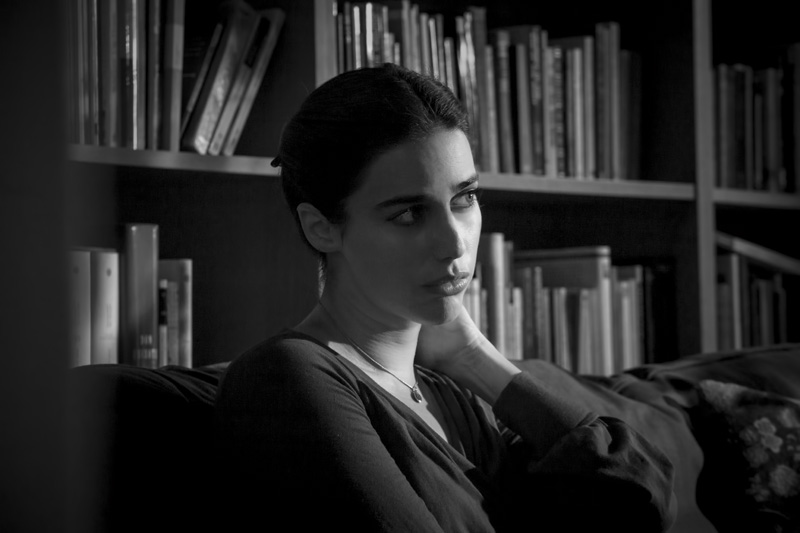
You say that you read Nabokov in a kind of obsessive way, reviewing each sentence to detail. Did this exhaustive reading break the illusion of the story, your feeling of being taken to a fictional world?
I completely get how one could feel that way, but for me it’s the opposite. The more deeply I re-read a sentence the more deeply I can imagine that fictional world and the more real it becomes. And I do that even with newspapers and articles and things that I become obsessed with. I start re-reading sentences. I do that because I know that it’s a way of touching with your finger the reality which words can offer you. The slower I read the more I know I am permeating my being, my heart and my soul with the truth of that fiction. So much so that by this marvelous alchemy it becomes a part of yourself. I can never see America in the same way after reading Nabokov, because now his way of seeing America, in Lolita for instance, is always going to be ingrained in my own vision, in my own brain circuitry. It’s something that Nabokov explained in his Gogol book. It’s a wonderful essay, and he says that Gogol was the first writer to see trees blue and skies green. He changed the way that we look at Saint Petersburg. And I think that is so true about the reading process itself and about literature, that by reading slowly you imbibe yourself with those images and those colors and the next time you are looking at Saint Petersburg or at a highway in California you are beginning to see melting mirages, honest colors of the gas pumps reminiscent of Edward Hopper, just as in Lolita. There is always this palimpsest of things, so it is impossible now to look at gas stations and not see through the various lenses which make them more real, more textured and more beautiful.
So you don’t share the idea of some critics who say that they have lost the illusion of reading because they see words, not worlds.
I don’t know what kind of work they do, but I understand what they are saying. As a friend of mine once told me, past a certain moment, if you deconstruct a text too much you cannot construct it back, you can’t be in touch with its meaning any more. There is a part of us that needs to keep that notion of mystery, of something that is not overly defined. And it’s the case for literature. It depends on what kind of work you do on the text. I was never interested in hyper-analyzing the text, or dissect it to the last word. I think the kind of mental work that I do is more connected to pleasure than to analysis. I really do it because I want to see better, and see the colors, and feel those textures. All of a sudden that world becomes more sumptuous.
Talking about reading, when I started The Enchanter and I read the first words “I have always dreaded reading and book”), I confess that I thought “Oh, man, get ready to deal with an unreliable narrator”. Then I understood that you weren’t lying at all, that that was a reference to Claude Lévi-Strauss in Tristes Tropiques. («I hate traveling and explorers»).
Yet Levi-Strauss’s opening is one of my favorite sentences in all of literature. It’s completely paradoxical, in my case, but because I give so much attention to words, it’s sometimes quite painful, because it requires so much concentration, to be pulled out of yourself and be there. You need to be in you and outside of you in order to embrace another voice and vision, to reimagine it. It’s like building a little city in your head. In literature, when there is a great description of architecture it often tires me physically, because I am not very good with space and orientation, so when I see all those words I try to put them together, but they resist and I know I’m going to have to go –as the Americans say- the extra mile. That precise re-imagining is a true physical effort. And sometimes it’s actually painful. There is a price to pay, there is a liminal space in which you are going to struggle to step into that world, but once you are there it’s extraordinary. The first 60 pages of Ada are impossible. They are incomprehensible, very confusing, kind of obscure, but you have to go through them to get to the “pure joyousness” part of the book.
You feel some horror confronting your imagination to Nabokov’s.
Yes, and your imagination grows. It’s exactly the definition of metamorphosis: when the butterfly is metamorphosing, when it’s a chrysalis some organs remain inside, but the rest becomes liquid and recomposes. Reading is also a metamorphosis in that sense: some of your imagination stays, but you have to be ready for the works that really will change you, and you have to be ready to be metamorphosed. And anyone who says that metamorphosis isn’t painful either has never gone through it or is unaware of what it entails. Any great work of art will transform your imagination and will make it stronger, wider. It’ll change your colors, but that is physically taxing. That’s why there is terror, but it’s a pathway to beauty and transformation.
And happiness, because you say that “happiness is the consciousness that we capture through words”. Why do you consider Nabokov a writer of happiness?
I believe it very much in a way that it was a premise for the book. What I try to explain in the foreword is that everybody says that Nabokov is the writer of sexual malaise, but I don’t believe that, he was aware that literature is about transgression. Essentially, desire is transgressive, literally, it is also a growing out of yourself, so you are transgressing the borders of the self. But you are also transgressing the limits that society imposes between beings and things. What interested me in the beginning was what can you do in the 20th century, where everything is permitted. So he finds two subjects, pedophilia and incest, which are still forbidden. But that’s only the beginning of the adventure. He says that Lolita has no moral in tow, and I think that’s correct. But really the transgression, what I was trying to say about Apuleius in Formentor, is that transgression of desire is really the beginning of the adventure, and this adventure is literature. Once you’re in there you’re in his world. What struck me most, in his world, was that he was indeed a great writer of happiness because of the way he observed the things about him. I have seen very few writers who have observed the world with this sensibility to light. The Odyssey is my favorite work, and every page of it is infused with light. The lustrous body of Calypso, the nymph who abducts Ulysses; you have glinting Pallas Athena…if you look through The Odyssey it’s really surprising how many expressions of light there are: lustrous, glinting, gleaming… The other writer I have read who has as much light as Homer is Nabokov. Every page is infused with light. And generally, every line is about observing the world as it unfolds before us. And really our only chance of happiness in the end is in observing every instant, taking it in and being surprised by it. And feeling that sense of ecstasy that beauty can offer. That’s what I saw in Nabokov and that’s what I wanted to convey. And I was very lucky to be able to talk on the telephone with John Updike a few years before he died. I pretended I was interviewing him for Le Monde, but really I was talking about Nabokov, because Updike admired Nabokov. He hated Ada but he’s too American to like Ada. But he also completely believed that Nabokov was a writer of happiness, and he has a beautiful sentence that I put in the book: “Nabokov writes prose in the only way it should be written, that is ecstatically”. In a The New Yorker article he talks about Glory. He titled the article “The crunch of happiness”, which I also used for one of my chapter titles. So you see, writing prose ecstatically, feeling the crunch of happiness in words and being the observer of light and let it ignite your senses, all that for me is the essence of Nabokov. And if that’s not happiness then I don’t see what happiness can be.
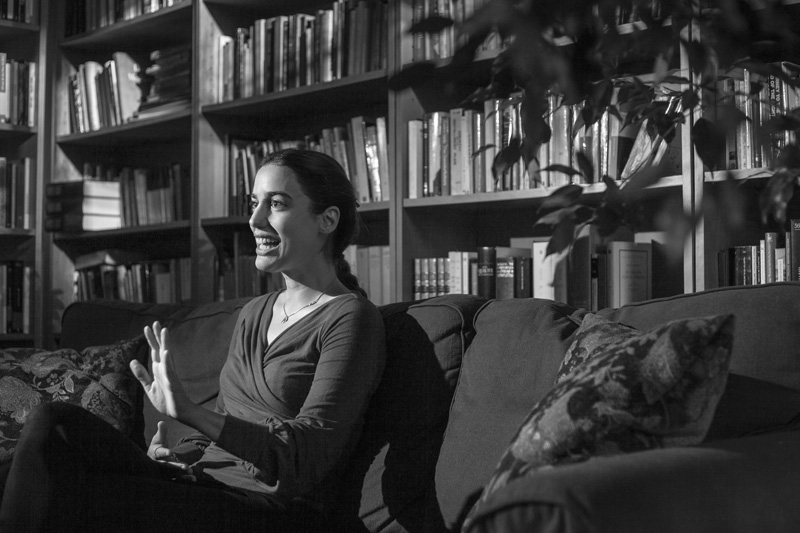
If somebody discovers Nabokov with The Enchanter, which image do you think they will create about the writer?
A very realistic image. I had to fight a lot of people over the years because they all said “dirty old man” and this and that. He certainly had an eye for beauty, I’m sure that when he was teaching at Cornell he was looking at the girls. He met Irina Guadanini in his twenties, when he was still in Europe, and he really fell in love with her, and he was caught because somebody sent a letter to Vera. And Vera said: “If you have fallen in love with her you should leave”. And I think he had fallen in love with her, but he decided not to leave, because he also loved Vera. The heart, as we know, is a deceitful and complicated thing. So he stayed. I am absolutely certain that he never cheated on her again. And I don’t believe he ever touched little girls, of course, these are such silly things I don’t even want to talk about them. He never had affairs with girls, and he was never a pedophile in that sense. One of his Cornell students, Alfred Appel, who was also his best critic, said he remembered eating butter in a mountain refuge with Nabokov when he was in his mid-seventies in Switzerland, and that he loved the taste of the butter. And a beautiful waitress came out and he was looking at her in ecstasy, and his student said “He had the gaze d’un vieillard encore vert”. Using French, it became a sweet poetic way of putting it. So, did he have an eye for beauty? Of course, and besides I think it would be a realistic portrait because readers would see him as being extremely tender and loving to his wife throughout his entire life. You see portraits of them in their mid-sixties and they look like teenagers in love, they adored each other. It was an unusual marriage, like most marriages are. It was also a happy marriage. And then, of course he was a complicated man of his generation, he was misogynist, he said he didn’t like women so much as collaborators or writers, but then he was also was a liar, like most writers. He had two woman translators in fact, and he liked Jane Austen. As I explain in the book, his obsession with the adolescent body is really his obsession with his own first sensual experiences in the wood of Saint Petersburg and that explosion of consciousness it afforded him. And the incredible thrill, the joy, the astounding transformation that experience lent him is one that stayed with him forever. And because he lost his first love and his country together, and later his father and his language, almost all at once, it all became this mythical event: something was irredeemably lost, but it also corresponded to an explosion of consciousness. So that is what he was going after all his life. He was obsessed with the adolescent body, for sure, but not because he wanted to have sex with it, but because he wanted to retrieve a paradise lost. That’s one of the things that interested me in The Enchanter. I don’t think I quoted this, but in Lolita he says “Poets never kill”. Artists and criminals can be very similar, there’s a very fine line, yet there is a difference. We may have the same fantasies, except we don’t act on them. So I do think, yes, that this is a realistic portrait of Nabokov.
How can we define The Enchanter? Is it accurate that definition that one of your friends made saying it is a «ULO – Unidentified Literary Object»?
Totally, I think that’s the perfect definition. It doesn’t really have a genre. It’s a combination of prose, fiction, non-fiction, and besides, some of the things that I say about myself are a lie. I like having a mask. I think it’s a wonderful thing to advance with a mask in every possible way. I don’t very much like the contemporary culture that consists in laying everything out about oneself.
Is it maybe an expression of your chaotic way of living?
Yes, in part. There are digressions. The book itself follows 15 ideas that are 15 digressions on Nabokov.
And there is a lot of Alice.
He loved Alice in Wonderland. The first book he translated into Russian was Alice in Wonderland, which he called Анья в стране чудес, “Anya in the land of marvels”, in Russian. And he called her Anya for phonetic reasons. He was obsessed with Alice, and Lolita is full of Alice. I have always loved Alice myself. It’s a work that’s very close to my heart, and I think about it often. I am always late, for instance, so I feel like the rabbit who is always late and looking at his watch. It’s wonderful when there’s a secret key to an apparent lack of order, and there’s a key to this book, which in essence is the sum of all the traces of light. It’s an ordered disorder if you will.
And of course there is a lot of love to Nabokov. As you say, “a long-distance love affair”.
Yes, exactly. It’s a love affair with his language, with his universe. What I was trying to say in the book regards a certain kind of metamorphosis: the world of Nabokov changed me, completely. It changed my English, made me a writer… But it was a daring thing to do, it was audacious, because I knew that one of the writers I most admired actually looked down on women as intellectuals and artists.
Would something be different without this distance? Would this love disappear?
Maybe, I don’t know. Of course I have met him many times in my dreams. And then I met Dimitri, who is very similar to his father, and we ended up becoming friends and, although he hated most Nabokovians, to my surprise he liked the book very much and wound up helping me. He later asked me to be on the board of the Nabokov Literary Foundation, which is a great honor. I am the only woman on the board, that makes me laugh.

What can we know about your next book?
I am finishing it now. It’s connected to what I was telling you at the beginning, about The Golden ass and The Metamorphoses. And it’s a rewriting of The song of Roland. It’s about the fact that with the first form of transgression begins literature. Tackling a medieval text and deciding that you are going to rewrite it is something frightening and transgressive in and of itself. It’s a desire for literature and an enormous desire for the world that the world can never completely fulfill. It’s this desire that becomes literature. If you love literature, you read and you see that all these works are interconnected. A writer is always rewriting another writer. Shakespeare was rewriting Ovid at times… and in these medieval tales, Ariosto is rewriting The song of Roland, Virginia Woolf is referencing Orlando Furioso, and I think Roland as well. The initial idea was to show and work down that genealogy of metamorphosis in literature. And then I realized that the question that most interested me when I started writing was a question that appears in the last film John Cassavetes made, Love Streams, a very dark film, in which at some point Gena Rowlands goes to a psychiatrist and says: “Is love a continuous stream?” and of course there is no answer. I think in the beginning that was my first question. That’s why I wanted a maximum space-time. And then I realized that there is a connection between love and literature, as Deleuze would say all art is a form of repetition and difference. The same is true of literature, you are rewriting beautiful medieval stories, that are told orally and retold, so you always have this repetition and difference. The same is true of love: love is a story often told that is always the same and yet always different. That was really the beginning of the canvas. And as the work was built I constructed it in seven different colors and it’s a story of love as a form of possession. It’s about why possession is one of the only possibilities for metamorphosis that we have. And there are not that many. It’s very difficult as adults to metamorphose. Beauty is one, love is another and perhaps experience with transcendence. But there are not that many. And if you read through a lot of psychoanalytical literature they will tell you the adult personality is so formed that there are in fact few moments in life when you are able to be metamorphosed. And I think the sensation of possession in love is one of these. The book is entirely about metamorphosis: the metamorphosis of literature, the metamorphosis of the lover and also the metamorphosis of characters.
In some conferences you’ve said that reading makes us better lovers. Could somebody not used to reading understand what you are saying, or your message is only for those who enjoy reading?
They put that title, but my lecture didn’t really have a title. It was actually called “First love”, and it was about Turgenev. I guess I said that at some point, but to be completely honest I don’t fully remember what I said, but I know that what I meant was that reading is not just a solipsistic activity, it makes you look at the world differently. And the world reflects back onto you and you become a co-creator of “reality.” As we look at the world we recreate it through what we’ve read and that in turn is channeled back into a different experience of living. It makes us better observers, and I’m pretty sure what I said in the talk had no sexual connotations, it was really about becoming lovers of life, meaning that it makes us appreciate and see things a lot better and be surprised. In Persian poetry you always have the lover and the beloved, but the true winner in Persian poetry is never the beloved, it is always the lover. The lover is the one who is transformed. And in order to be the most generous, the most imaginative, the most powerful lover that you can be you have to have an immense capability of observation. We are able to love better because we observe better, because we have a better sense of empathy, a greater sense of connection, because we see the small beauties or the details that we wouldn’t otherwise see. And this capability to refine vision is really the great gift of art. It’s something that I learned from Nabokov and that I take with me on my new journeys.
During your interview to Orhan Pamuk he said: “My golden rule for writing a novel is to identify with all the characters. Identifying with the darkest characters is what makes a novel essentially powerful. The finest example is surely Dostoyevsky.” There is some controversy with some cognitive research that relates reading fiction with empathy. Do you agree with this relation? Do you think reading could make us more empathetic?
If you have no interest in books, or in the imagination, I don’t believe reading will produce that alchemic reaction, although I don’t believe that this alchemy is strictly contained in so-called high-brow literature. I was sitting on the airplane next to someone who was reading Song of Ice and Fire and he said that he never reads, but that this book is extraordinary, and it was transforming him in a way that Shakespeare might transform someone else. That alchemy can happen with different types of text in anyone who’s willing to give the imagination a chance. So in that sense, I believe it’s possible, and also with movies as long as there is something to a film. Sometimes “intellectuals” like to discard a lot of popular culture, but I disagree with that stance. In books that appeal to the collective imagination, for instance, I often find some very interesting constructions, there is something there that somehow is intelligent and appeals to people for reasons other than just mass-marketing and consumption. And in that intelligence, there is a potential for transformation. But perhaps that transformation has something to do with observation rather than empathy. We do become better observers of the world, and I’m optimistic in that sense, I don’t think it’s reserved for the happy few. That’s also why it’s wonderful to speak about literature with people who aren’t, strictly speaking, intellectuals. Beyond that, I think there’s a difference between observation and empathy. If literature necessarily makes you more empathetic… I don’t know. That argument makes it sound like literature is a nice little potion, it puts it almost on the medical side. Empathy has a moral compound to it, as if books whispered: “Drink me and it will make you a better person”. And I’m not interested in better people. Chekhov, in a slightly different vein from Pamuk, said he himself was all his characters, which I think we are indeed, both as writers and readers. The Russians believed that the line between good and evil runs through our hearts. And if we are honest with ourselves we can find in our own hearts aspects of all literary characters. In Hebrew “Satan” means “The adversary”, and the greatest adversary, of course, is within ourself, he’s the one who stops us from doing what we would like to do. I love this notion of Satan as the adversary, and if that is indeed the case, then we hold it all inside our hearts. So literature can help in the great task of “knowing thyself”, and perhaps, in the best of cases, of expanding the heart.
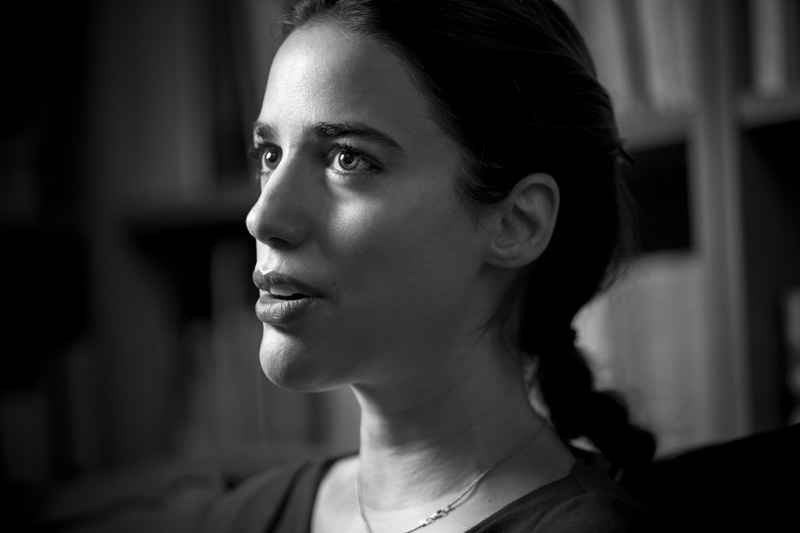
You are involved in Narrative4, “a community of empathic global citizens who improve the world through the exchange of personal narratives”.
That’s a somewhat different endeavor, because in Narrative4 you would tell me a story about your life. You tell me your story and I tell you my story — then I tell your story as if I were you and you tell my story as you were me. So we try to get these kids who are very isolated to speak to one other –they come from extremely harsh neighborhoods, are involved in gangs, often have been to jail, one of them was sentenced to twelve years of prison for drug-trafficking…- and it’s wonderful to see the kids opening up. Of course, I think that in an ideal sense you want to say that literature should be doing just that, but it’s a dangerous path because it leads to a moral grounding, and I never want to think that there is a usefulness to art in that sense. But what we do with the kids is giving them a safe space to open up, to bring their mad, painful, chaotic worlds into a space where they feel safe to share and unburden themselves and have other kids listen. And I have done it with some of the kids and it’s funny because it fosters friendships immediately. Everybody is so different, everybody is looking at themselves strangely, and then you exchange a story and you see those kids lightening up because they find it fun and relieving and at times life-saving, so it’s different, it’s like a playground for opening up. It’s a pretext almost for opening a conversation that would never occur, and it’s really about that exchange of voices, that conversation that happens in a playful way. That’s beautiful. What we are trying to do now is create a program called “Empathy into action”, where they actually go into the world and discover that they can impact their own communities through empathy. Just recently, for instance, we did a story exchange in New York between gun owners and gun violence victims. Those things I believe in. I feel that what we do as writers, as intellectuals, as researchers, makes sense insofar as we remain connected to the world. It’s always what I’m trying to do in whatever humble capacity. And I always love to look at people in the eyes. I didn’t really get to know any of my grandparents, unfortunately, but one thing that came down to me from my maternal grandmother was this: she always said “Look at people in the eyes”. And that, for me, is empathy. And it has changed my life, our lives many times. My mother escaped the airport in Iran, during a day of great convulsion in which the country eventually closed its borders, and she escaped because somebody saw her cry and asked why, and she looked him in the eyes, and he told her she was going to get on the last flight out, and she was in fact the last person to be called on that last flight out, although she had no ticket, no reservations, just a suitcase full of photographs. And in far less dramatic circumstances I have seen the lines of my own life change because, in the most random of circumstances and the strangest of places, I looked at someone in the eyes and said “Could I please do this? Could I go there?” And they said “Yes”. But that’s because for one minute you have looked at them and you are really saying “You, as human being, would you help me?” For me it’s one of the miraculous things of life. To see that although we have that line between good and evil that crosses our heart, it is possible, by looking into somebody’s eyes, to sway them toward the best part of themselves. And for me that’s the most magical experience in life. It happens all the time. You see people who are angry, look mean and it seems they are out there to trample you, but then you look at them in the eyes and all of a sudden there is a moment of perturbation, a vacillation and then something changes for no reason at all. It’s incredible. All of a sudden you connect with what is truly human in them in the best possible way.
Last question: some book recommendations to better understand Lila’s universe?
I would definitely put The Golden Ass by Apuleius, I would read the Persian poet Hafez, who influenced Goethe a lot, I love more than any work in the world The Odyssey, I absolutely adore it. I love Hamlet for other reasons, and I read a lot of poetry, among contemporary authors, my favorites are Anne Carson and Michael Ondaatje, who is also an extraordinary novelist (to me he embodies the ideal that at their best prose and poetry are but one and the same). The common thread between all of them is that they illumine the world. Hannah Arendt said that in the darkest of times there are a few men and women who keep on shining their light over the path. And for me that’s exactly the task of the great writer. And so we circle back to light…
